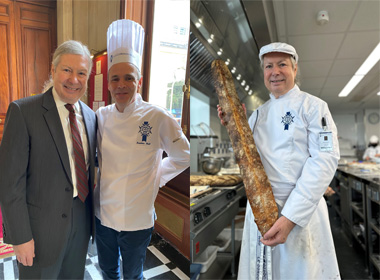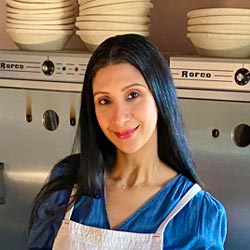Teaching methods
The aim of the Diplôme de Boulangerie is to provide the strong theoretical and practical grounding required to pursue a professional career in boulangerie and/or viennoiserie.
The programme’s content has been designed to draw on interactive teaching methods and to leverage skill enhancement through individual practical application.
Classes are taught in French with simultaneous translation into English and include:
- Online basic theory classes by Le Cordon Bleu Paris institute instructors and demonstrations by the institute’s Chefs to focus on the practical application of knowledge.
- Talks, demonstrations and video content shared by Chefs from the international Le Cordon Bleu network.
- Application and practical sessions with constant support from Chef Instructors to appraise students’ work
- Professional educational visits
The programme is centred around active student participation, both in real-life situations and simulated environments, developing the students’ ability to work autonomously and responsibly and cultivating a responsible work ethic.
Assessment methods
Students are assessed based on cross-curricular Learning Outcomes as well as specific objectives for each part of the programme. Various methods of assessment may be used, including:
Written assessments: Examinations or quizzes where students are asked to give written answers to multiple choice questions, true/false questions, short-answer questions, structured dossier or a combination of any of the above.
Practical assessments:
- Continuous assessment of progress: Continuous assessment of students' work in practical classes. Grades are accumulated for the duration of the programme.
- Final practical exam: Examination during which a series of tasks must be completed under supervision. Each student’s performance is evaluated against formal assessment goals, and a standardised grading scale is used to determine the operational skill level attained.
- Oral presentation: Presentation of either a practical task or part of the portfolio, or a presentation to pitch the saleability of a product
- Portfolio: The portfolio catalogues the student's accomplishments during the programme, presented in a clear and logical format (the portfolio may include examples of practical work, notably dishes the student has prepared, as well as other written or visual content).
Students will be required to understand and apply what they learn in order to successfully complete the programme. Regular attendance is therefore a prerequisite for success.



